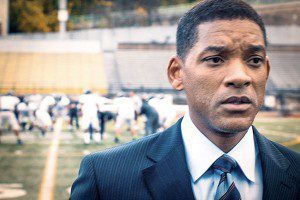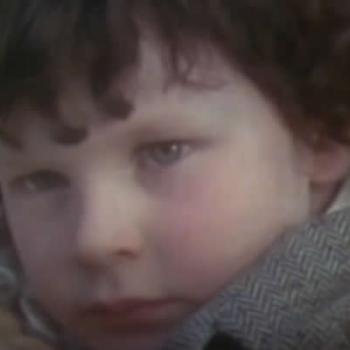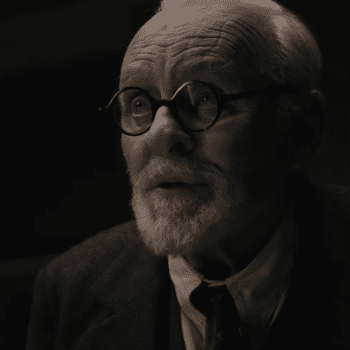
I may not bleed orange and blue, but on game days I sweat the colors a little.
I love the Denver Broncos, and I don’t think that’s too strong a word for it. It’s practically a requirement when you live in Colorado, and those that don’t cotton to ’em around these here parts are destined for a lifetime of scorn and crusty looks. When people ask me what my favorite television shows are, I say “football,” and I will always, always carve three hours out of my schedule to watch my beloved Broncos in action.
Lots of folks feel the same way I do. American football is often called a secular religion here, and with reason. We football fans are zealous adherents to a violent faith. And that makes Concussion a difficult movie for us to watch.
Throughout its long, rewarding and surprisingly entertaining run, Concussion draws explicit parallels between faith and football. One Southern football doctor (Alec Baldwin) says his daddy raised him with a clear set of priorities: “God is number one,” he says, holding up two fingers, “and football is number two,” he adds holding up one. And Concussion helps us see why the sport holds such a powerful hold on us.
Characters talk about the sport’s beauty and power, it’s strange blend of raw aggression, cerebral planning and ballet-like grace. But it’s bigger than mere aesthetics: For the people of Pittsburgh, where the story unfolds, it’s a source of inspiration.
We’re told that when the factories closed and unemployment was at its most cruel, the NFL’s Pittsburgh Steelers gave the city not just an identity, but its hope. Its citizens turned to football for solace, and all those Super Bowl trophies and Hall of Famers proved to be mighty effective salve.
“Iron Mike” Webster (played by David Morse) was one of the city’s heroes. He played 15 seasons and won four Super Bowls with the Steelers, and he was inducted into the Hall of Fame in 1997. Five years later, he was dead—found in his truck, where he lived for much of his last few years. It was a sad coda for this hometown hero: He’d gone a little crazy, pulling out his teeth and trying to re-attach them with super glue. But hey, sometimes it happens, people figured. Not every hero gets a happy ending.

But when coroner Dr. Bennet Omalu (Will Smith) examined Webster’s brain, it seemed at first perfectly healthy—unusual to see in a crazy man. Only a battery of more thorough tests, run at the doctor’s own expense, reveals the depth of Webster’s brain damage. Omalu begins to wonder what sort of activity could shatter its workings so effectively, so completely and so discreetly.
He turns his attention to football, America’s secular religion.
The Nigerian-born Omalu is, admittedly, not a member of this sporting sect. His work is motivated by a higher faith. Throughout the movie we see evidence of his Christian beliefs, from the crosses that hang in his home and car to the Bible by his nightstand to the moments we see him in prayer. He attends church religiously (as it were), and when a young woman, recently immigrated from Nigeria herself, needs a place to stay, Omalu’s church asks him if he might have an extra bedroom.
And when he becomes convinced that Webster did not die naturally—that the thousands of repeated blows that he took to the head in football, in fact, caused his brain to self-destruct—Omalu frames his finding in religious terms.
“God did not intend for us to play football,” he says.
Most folks don’t want to hear that. In fact, many people in Concussion refuse to listen. “The NFL owns a day of the week,” Dr. Cyril Wecht (Albert Brooks) warns him. “The same day the Church used to own.” But Omalu doesn’t back down, even in the face of withering criticism.
In some ways, Concussion is a bit of a companion piece to Spotlight—another excellent movie about the difficulties of telling uncomfortable truths about beloved, powerful institutions. But whereas organized religion was at fault in Spotlight, faith is a catalyst for better things here. The movie suggests that this particular truth needed someone like Omalu—an idealistic outsider whose only goal was to save lives—to tell it. And faith is integral to the person who Omalu is.
“I am the wrong person to have discovered this,” Omalu tells his girlfriend, Prema. But she says he has it wrong. “There is no coincidence in this world,” she says, ticking off all the reasons why he’s absolutely the right person. “If you know, you must come forth and speak.”
We tend to make excuses for the things we love. We’re blinded by the beauty we find in them. And when we’re confronted by nasty, inconvenient facts about those things we cherish, our instinct—or, more truthfully, my instinct—is to be a little like the NFL in Concussion. We ignore them. We pretend not to hear them. And when that’s not possible, we look for every reason—logical or no—to refute them.
But Christianity asks us to challenge what’s most precious in our lives. Is this really good for you? It asks us. Is it healthy? Is it wise? It should force us to question what we hold most dear, because God knows that what we love isn’t always what we should love. It doesn’t ask us to turn our backs on those things, necessarily. But it does ask us to look at them with a clear eye, and maybe even a dose of skepticism. That goes for football. Movies. Our hobbies and pastimes. Our inclinations and obsessions. Even the Christian Church itself, for that matter.
I believe that Christians should be zealous seekers, and defenders, of truth. “You will know the truth, and the truth will set you free,” we hear in John. Truth is mentioned 235 times in the Bible, and not once are we asked to ignore it or shoo it away if it proves to be too inconvenient. Concussion—a fascinating, compelling and deeply convicting movie—shows us what telling unpopular truths can look like.













